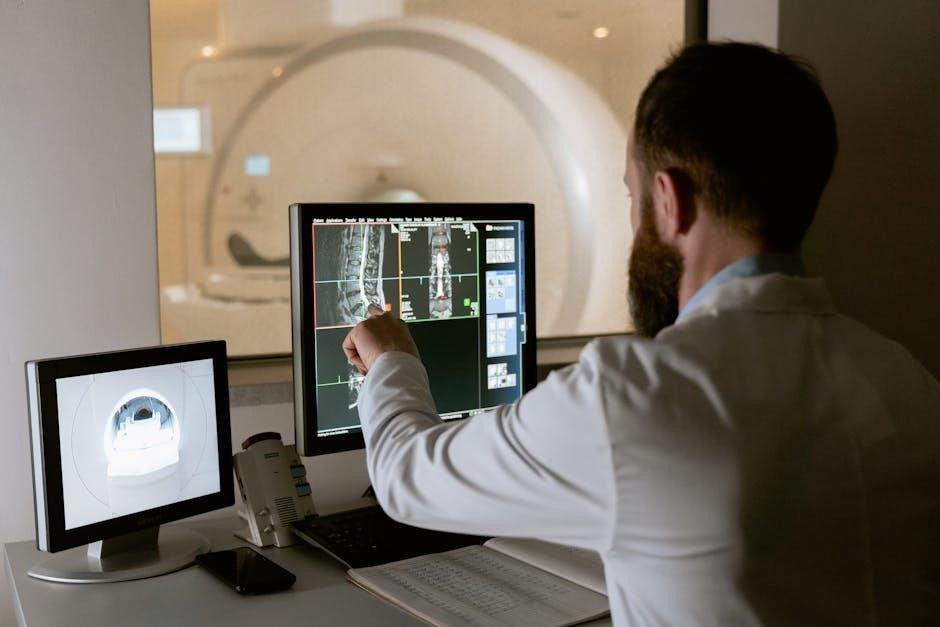disc assessment free pdf

The DISC Assessment is a popular personality profiling tool categorizing behavior into four traits: Dominance, Influence, Steadiness, and Conscientiousness․ It aids in personal and professional development, offering insights into behavioral tendencies․ Widely used for team building and recruitment, the DISC Assessment is accessible via free PDF resources, enabling individuals to evaluate their style effectively․
What is DISC Assessment?
The DISC Assessment is a behavioral profiling tool categorizing individuals into four traits: Dominance, Influence, Steadiness, and Conscientiousness․ It helps identify how people interact and behave in various situations․ Based on the work of William Moulton Marston, DISC assesses personality styles to enhance personal and professional development․ The assessment is typically simple, involving adjective-based questions, and is widely used for team building, leadership, and recruitment․ Free PDF versions are available, offering a cost-effective way to gain insights into behavioral tendencies and improve communication skills․ It is a practical framework for understanding individual strengths and areas for growth․
Importance of DISC Assessment in Personality Profiling
The DISC Assessment is a valuable tool for understanding individual behavioral styles, enhancing communication, and improving teamwork․ By identifying Dominance, Influence, Steadiness, and Conscientiousness traits, it provides insights into how people interact and respond in various situations․ This profiling helps in personal development, leadership growth, and conflict resolution․ Organizations use DISC to build effective teams and improve collaboration․ Its simplicity and accessibility, especially through free PDF resources, make it a popular choice for self-assessment and professional development․ Understanding these behavioral tendencies fosters better relationships and workplace dynamics, making DISC a practical and impactful framework for personal and organizational success․

Key Components of DISC Assessment
The DISC Assessment evaluates four core traits: Dominance, Influence, Steadiness, and Conscientiousness․ It provides insights into behavioral styles, decision-making, and communication preferences, helping identify strengths, weaknesses, and growth areas․
The Four Behavioral Traits: Dominance, Influence, Steadiness, and Conscientiousness
The DISC Assessment revolves around four distinct behavioral traits: Dominance (D), Influence (I), Steadiness (S), and Conscientiousness (C)․ Dominance measures assertiveness and control, reflecting how individuals handle challenges․ Influence assesses communication style and social interaction, highlighting enthusiasm and persuasion abilities․ Steadiness evaluates patience and persistence, showing how well someone maintains consistency in tasks․ Conscientiousness focuses on attention to detail and organization, indicating a preference for structure and planning․ These traits provide a comprehensive framework for understanding individual behavioral preferences, enabling personalized insights for personal and professional growth․ Each trait is scored on a scale, creating a unique profile for every participant․
Understanding the DISC Personality Profiling Test
The DISC Personality Profiling Test is a behavioral assessment tool designed to evaluate individual preferences in workplace interactions․ It typically consists of a questionnaire with scenarios and multiple-choice responses, measuring how participants behave in different situations․ The test categorizes responses into the four DISC traits: Dominance, Influence, Steadiness, and Conscientiousness․ Results are often visualized on a graph or wheel, illustrating the prominence of each trait․ The test is widely used in professional settings to enhance self-awareness, improve communication, and foster teamwork․ While not requiring certification to administer, consistency in responses is crucial for accurate results․ It’s a practical tool for personal and professional development․

How to Use a Free DISC Assessment PDF
A free DISC assessment PDF provides a cost-effective way to evaluate personality traits and behavioral tendencies․ It allows individuals to identify strengths and areas for improvement, fostering self-awareness and personal growth․ The PDF format makes it easily accessible and shareable, enabling users to complete the assessment at their convenience․ Results can be used to enhance communication, teamwork, and leadership skills, making it a valuable tool for both personal and professional development․
Steps to Download and Complete the DISC Personality Test PDF
To download and complete a free DISC assessment PDF, start by finding a reputable source online․ Ensure the PDF is from a trusted provider to guarantee accuracy․ Once downloaded, review the instructions carefully before beginning․ Answer the questions honestly, selecting options that best reflect your typical behavior․ Most assessments are self-scoring, with guidelines provided to tally your responses․ After completing, refer to the included key to interpret your scores and determine your DISC profile (D, I, S, or C)․ Reflect on the results to identify strengths and areas for growth․ Consider sharing your profile with a mentor or coach for deeper insights․
Benefits of Using a Free DISC Assessment PDF
Using a free DISC assessment PDF offers numerous benefits, including cost-effectiveness and accessibility․ It provides individuals with a convenient tool to gain insights into their behavioral preferences and personality traits․ The assessment helps improve self-awareness, aiding in personal and professional development․ It also fosters better communication and teamwork by understanding others’ styles․ Additionally, free DISC PDFs are often self-administered, allowing users to complete them at their own pace without supervision․ This makes it an ideal resource for individuals, educators, and organizations looking to enhance understanding of behavioral dynamics without financial investment․ It’s a practical and efficient way to unlock personality-driven growth opportunities․

Interpreting DISC Assessment Results
Understanding strengths and weaknesses through DISC results helps individuals align their behaviors with goals, fostering personal growth and improved relationships․ It also aids in workplace communication and team dynamics, enhancing overall performance․
Understanding Your Personality Profile
A DISC personality profile provides insights into an individual’s behavioral tendencies, categorizing them into Dominance, Influence, Steadiness, and Conscientiousness․ The free PDF assessment offers a visual representation of these traits, often displayed as a graph or series of scores․ This helps individuals identify their strengths and areas for improvement․ By understanding their profile, users can enhance communication, improve decision-making, and align their behaviors with personal and professional goals․ The profile also highlights how one interacts with others, making it a valuable tool for self-awareness and growth․ The clear and concise format of the free PDF ensures accessibility for everyone․
How to Apply DISC Results in Personal and Professional Development
Applying DISC results involves leveraging your strengths and addressing areas for growth․ In personal development, focus on enhancing self-awareness by identifying your dominant traits and how they impact your interactions; Professionally, align your role with your natural tendencies, improving communication and collaboration․ Use your DISC profile to set actionable goals, such as developing weaker traits or refining decision-making skills․ Additionally, seek feedback from colleagues to validate your insights and foster improvement․ The free PDF serves as a practical guide, offering tailored strategies to maximize your potential and achieve success in both personal and professional spheres, ensuring continuous growth and effectiveness․

Applications of DISC Assessment
DISC assessments are widely used for team building, leadership development, recruitment, and employee training, helping organizations enhance collaboration and communication by understanding individual behavioral styles effectively․
Using DISC for Team Building and Leadership Development
DISC assessments are invaluable for fostering effective team dynamics and nurturing leadership skills․ By identifying individual behavioral styles, team members can better understand each other’s strengths and weaknesses, enhancing collaboration and communication․ Leaders can leverage DISC insights to adapt their management strategies, ensuring they motivate and guide their teams more effectively․ This approach promotes a culture of empathy and mutual respect, leading to stronger team cohesion․ Additionally, DISC-based training programs help leaders develop situational awareness, enabling them to respond appropriately to various personalities and scenarios, thereby improving overall team performance and organizational success․
Role of DISC in Recruitment and Talent Management
DISC assessments play a crucial role in recruitment and talent management by helping organizations identify candidates whose behavioral styles align with specific roles and company cultures․ Employers can use DISC profiles to evaluate how well a candidate’s traits, such as dominance or conscientiousness, fit the job requirements․ This tool also aids in creating balanced teams by ensuring diversity in behavioral styles․ Additionally, DISC insights support talent development by identifying employees’ potential for growth and leadership․ By aligning roles with natural tendencies, organizations can enhance job satisfaction, reduce turnover, and improve overall performance, making DISC a valuable asset in strategic workforce planning․

Limitations and Considerations
DISC assessments rely on self-assessment, which may introduce biases․ Results can be influenced by situational factors and may oversimplify complex personalities․ Interpretation requires expertise․
Potential Limitations of the DISC Assessment
The DISC assessment, particularly in free PDF formats, may lack depth and customization compared to paid tools․ Results are based on self-perception, which can be influenced by biases or situational factors․ The model oversimplifies complex personalities into four traits, potentially missing nuances․ Free versions often skip advanced analytics, limiting interpretive insights․ Additionally, the assessment’s effectiveness depends on honest responses, and its application in decision-making requires skilled interpretation to avoid misclassification․ While useful for general insights, it’s not a standalone tool for critical decisions like hiring or deep psychological analysis․ Context and expertise are crucial for accurate and ethical use․
Factors to Consider When Using DISC for Decision-Making
When using DISC assessments for decision-making, ensure the tool aligns with the specific context, such as hiring or team building․ Avoid relying solely on DISC results; integrate them with other evaluation methods for a holistic view․ Interpretation requires expertise to avoid misclassification of traits․ Free PDF versions may lack depth, so consider their limitations in critical decisions․ Additionally, cultural and situational factors can influence responses, requiring careful consideration․ Lastly, recognize that DISC measures preferences, not skills or intelligence, so pair results with practical observations for more informed choices․ Balancing these factors ensures ethical and effective decision-making․

Case Studies and Practical Examples
A tech company used a free DISC assessment PDF to improve team communication, reducing conflicts by 40%․ A retail business applied DISC insights to enhance customer service, boosting satisfaction scores․
- A nonprofit optimized team dynamics using DISC, increasing project efficiency․
- An educational institution used DISC to tailor teaching methods to student preferences․
These examples highlight practical applications of DISC assessments in real-world scenarios․
Real-Life Applications of DISC Assessment in Organizations
Organizations worldwide leverage the free DISC assessment PDF to enhance workplace dynamics․ For instance, a manufacturing company used it to identify leadership styles, improving safety compliance by 30%․ A healthcare provider applied DISC insights to personalize patient care approaches, boosting satisfaction ratings․ Additionally, a financial firm utilized the assessment to tailor sales strategies, resulting in a 25% increase in revenue․ These examples demonstrate how the DISC framework helps organizations align team behaviors with strategic goals, fostering collaboration and driving measurable outcomes․
- Improved employee engagement and reduced turnover in a retail chain․
- Enhanced communication in cross-functional teams within a tech startup․
Success Stories from Using DISC Personality Profiling
The DISC assessment free PDF has empowered organizations to achieve remarkable results․ A global tech startup used it to streamline hiring, reducing recruitment time by 40% and improving team cohesion․ A leading educational institution implemented DISC to enhance student mentorship programs, resulting in higher academic performance․ Additionally, a nonprofit organization leveraged DISC insights to train volunteers, boosting fundraising efforts by 25%․ These success stories highlight how the DISC framework fosters better communication, collaboration, and goal alignment, driving measurable outcomes across industries․
- A marketing agency increased client satisfaction by 35% through personalized strategies․
- A logistics company improved workflow efficiency by 20% using DISC-based role assignments․

Best Practices for Administering DISC Assessments
Ensure clear instructions, a quiet environment, and sufficient time․ Verify PDF accessibility and provide guidance to encourage accurate and honest responses, ensuring reliable and effective assessment outcomes․
Ensuring Accuracy in DISC Test Results
To ensure accuracy in DISC test results, provide clear instructions and a distraction-free environment․ Encourage honest responses by emphasizing anonymity and the purpose of the assessment․ Verify the DISC assessment PDF is accessible and free from technical issues․ Offer examples or clarifications if needed to avoid misunderstandings․ Allow sufficient time for completion to prevent rushed answers․ Ensure participants understand the importance of their genuine responses for reliable outcomes․ Using validated tools and ensuring consistency in administration further enhances accuracy․ Regularly review and update the assessment to reflect current behavioral science standards, ensuring the results remain relevant and trustworthy․
Creating a Conducive Environment for Taking the DISC Test
To create an ideal environment for taking a DISC assessment, ensure the space is quiet, private, and free from distractions․ Provide clear instructions and allow sufficient time to complete the test without rushing․ Use a compatible device for the DISC assessment PDF to avoid technical issues․ Encourage participants to be in a calm and focused state, with minimal interruptions․ Offer a comfortable setting, including proper lighting and seating, to enhance concentration․ Ensure the purpose of the test is clearly communicated to promote engagement and honest responses․ A well-prepared environment fosters accurate and reliable results, maximizing the effectiveness of the DISC personality profiling experience․

Comparisons with Other Personality Assessments
The DISC assessment is often compared to tools like MBTI, but its focus on observable behaviors makes it more practical for workplace applications and team dynamics․
Differences Between DISC and Myers-Briggs Type Indicator (MBTI)
While both DISC and MBTI are popular personality assessments, they differ in approach․ DISC focuses on four observable behavioral traits (Dominance, Influence, Steadiness, Conscientiousness), offering practical insights for workplace interactions․ MBTI, however, categorizes individuals into 16 personality types based on four dichotomies (Extraversion/Introversion, Sensing/Intuition, Thinking/Feeling, Judging/Perceiving)․ DISC is often seen as more action-oriented, while MBTI provides a deeper dive into cognitive preferences․ DISC is frequently preferred in professional settings for its simplicity and applicability to team dynamics and leadership development, whereas MBTI is often used for personal growth and self-awareness․ Both tools complement each other but serve distinct purposes․
How DISC Compares to Other Behavioral Assessment Tools
DISC stands out among behavioral assessment tools for its focus on observable actions rather than underlying motivations․ Unlike the Big Five Personality Traits, which assess broader personality dimensions, DISC centers on workplace behavior, making it highly practical for professional settings․ While tools like Myers-Briggs and Thomas-Kilmann focus on type-based categorizations or conflict resolution, DISC offers a straightforward framework for understanding behavioral styles․ Its simplicity and applicability to team dynamics, communication, and leadership make it a preferred choice for organizations seeking actionable insights․ However, it’s often complemented with other tools for a more comprehensive understanding of personality and behavior in diverse contexts․

Troubleshooting Common Issues
Common issues with DISC assessments include technical glitches, unclear instructions, or misinterpretation of results․ Ensure compatibility with your browser, carefully review questions, and verify responses for accuracy․
Resolving Common Problems with DISC Assessment PDFs
When encountering issues with a free DISC assessment PDF, start by ensuring the file is downloaded correctly and that you have the latest PDF reader installed․ If questions are unclear, review the instructions or seek clarification from the provider․ For technical problems like incomplete downloads, check your internet connection and retry the download․ If the PDF is not interactive, ensure your software supports fillable forms․ Save your progress regularly to avoid losing data․ For printing issues, verify that the PDF is not password-protected and adjust print settings as needed․ If problems persist, contact the provider for assistance․
Addressing Misconceptions About DISC Personality Profiling
A common misconception about DISC personality profiling is that it oversimplifies human behavior by categorizing individuals into just four traits․ However, DISC provides a nuanced framework for understanding behavioral preferences rather than rigid labels․ Another misconception is that DISC predicts behavior in all situations, when in fact, it identifies tendencies that may vary based on context․ Additionally, some believe DISC is only for personal development, but it is widely used in professional settings for team building and leadership․ By clarifying these misunderstandings, individuals can better appreciate the practical applications and value of DISC assessments in both personal and professional growth․
Final Thoughts on the Value of DISC Assessment
A free DISC assessment PDF offers a practical and accessible way to gain insights into behavioral preferences, empowering individuals and teams to enhance communication and collaboration․ By understanding personality traits, users can identify strengths, address weaknesses, and improve decision-making․ The tool’s simplicity makes it ideal for personal growth, leadership development, and team dynamics․ Organizations can leverage it to foster a culture of self-awareness, leading to improved productivity and harmony․ Ultimately, a DISC assessment PDF is a cost-effective resource for anyone seeking to unlock their potential and create meaningful connections in both personal and professional environments․
Encouragement to Explore DISC Personality Profiling
Exploring DISC personality profiling through a free PDF is an excellent way to uncover insights into your behavioral tendencies and improve personal and professional interactions․ This accessible tool provides a straightforward method to identify strengths and areas for growth, fostering better communication and teamwork․ By understanding your profile, you can enhance leadership skills, resolve conflicts, and make informed decisions․ Embrace this opportunity to gain self-awareness and empower yourself and your team to thrive in various environments․ With the convenience of a free PDF, there’s no barrier to starting your journey towards personal and professional development․ Take the first step today and unlock your full potential․